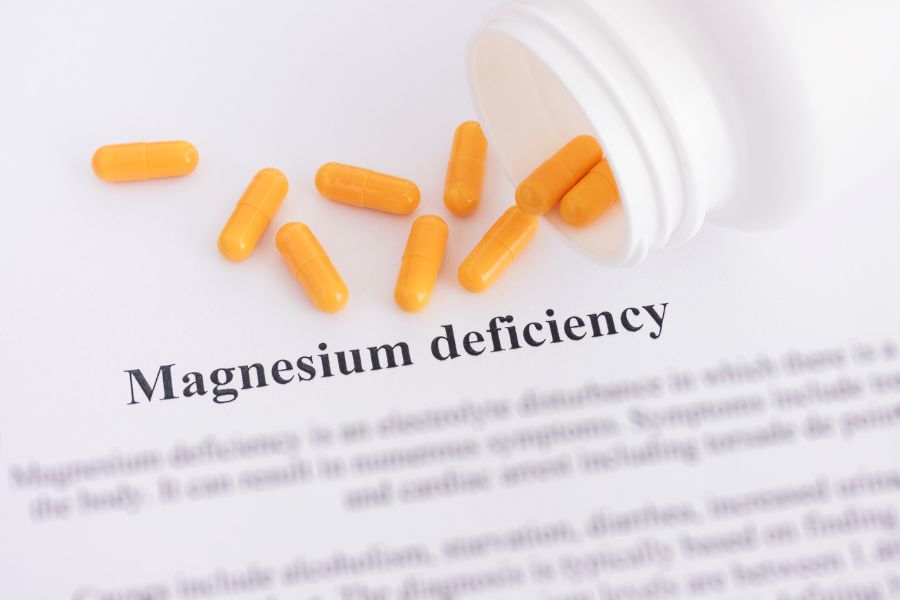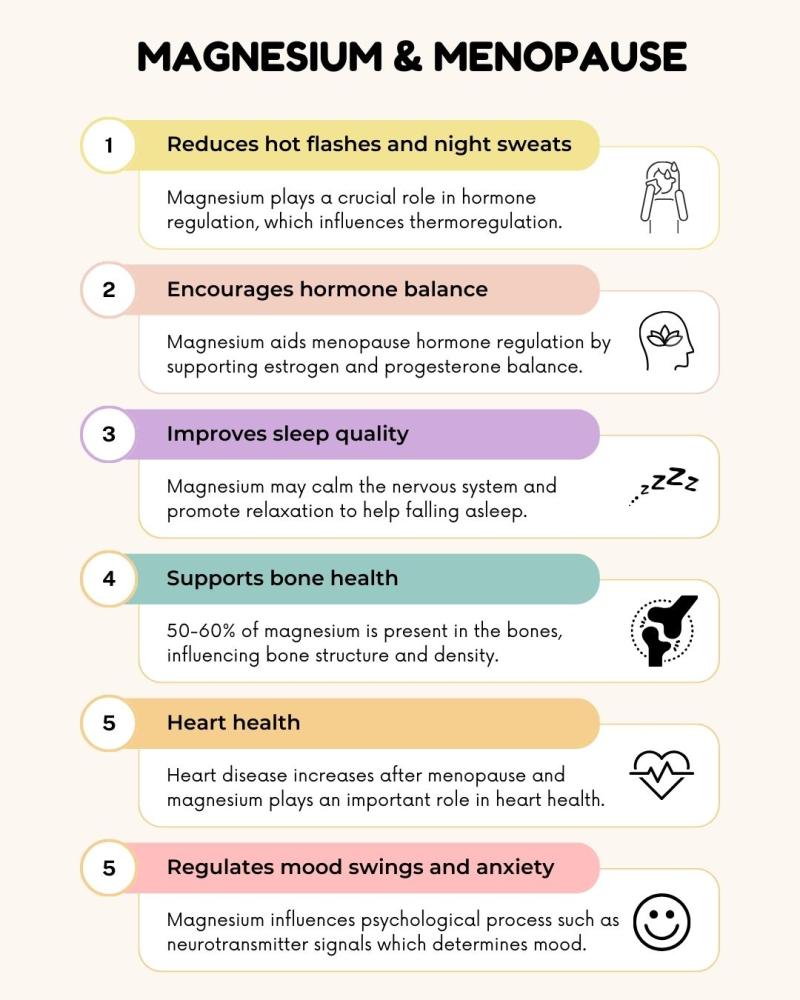
Why is magnesium important during menopause?
The vital role magnesium plays in supporting menopause and reducing the severity of symptoms is something that more women are becoming more aware of. As understanding grows about the importance of magnesium in addressing menopausal symptoms like hot flashes, night sweats, and mood swings, many are turning to magnesium supplementation.
In this blog we explore what happens to magnesium levels during menopause and delve into the well-studied health benefits of increasing magnesium intake
Read More: Menopause 101: Everything You Need To Know

Magnesium deficiency during menopause:
Magnesium is important during menopause because women typically have lower levels during this period due to declining estrogen. An inadequate amount of magnesium levels can heighten symptoms of menopause, therefore maintaining sufficient levels is crucial in reducing the severity of these magnesium-related symptoms. Low levels of magnesium during the menopause can be the result of the following factors:
- Hormone changes: The decline in estrogen significantly impacts magnesium levels as estrogen helps to regulate the absorption and excretion of magnesium. Therefore as estrogen declines, many women begin to experience magnesium deficiency.
- Changes in the gut microbiome: Changes in hormone levels can disrupt the digestive system, affecting the body's metabolism and impacting the body's ability to absorb magnesium effectively.
- Stress: During menopause, women are often exposed to elevated stress levels due to the symptoms of menopause. Furthermore, as hormone levels drop, serotonin levels (the happy hormone) also drop, leading to symptoms of stress and anxiety. This results in an increase in cortisol (stress hormone) production which leads to higher magnesium exertion.
Due to these changes, menopausal women might experience less efficient absorption of magnesium and other nutrients. This is why it’s important for women going through menopause to pay attention to regulating their magnesium levels.
Benefits of magnesium during menopause

Hormone Regulation:
Magnesium aids menopause hormone regulation by supporting estrogen and progesterone balance[1]. As a cofactor in enzymatic reactions involved in hormone synthesis and metabolism, magnesium supports optimal hormone levels. Additionally, magnesium helps regulate neurotransmitters like serotonin[2], which influence hormonal pathways. By promoting hormonal balance and mitigating symptoms associated with hormonal fluctuations during menopause, magnesium supplementation can offer relief and support women's health during this transition.
Bone Health:
Between 50-60% of magnesium is present in the bones, with the majority found in soft tissue, influencing bone structure and density[3]. Low estrogen during menopause increases the risk of osteoporosis which is the weakening of bone density[4]. Women can lose an average of 10% bone mass within the first 5 years after menopause. Magnesium also aids in the regulation of calcium levels and the activation of vitamin D, both crucial for healthy bone formation and maintenance. A study found that magnesium supplementation was able to prevent bone fractures and significantly increase bone density in a 2 year study[5], in a short-term 30 day study magnesium was able to both reduce bone loss and promote bone formation[6]. Therefore, increasing magnesium intake can help to maintain and improve bone health during this phase.
Sleep quality:
Menopause can often disrupt sleep due to a combination of menopausal symptoms such as hormone changes, depression, stress, and night sweats. However, magnesium may calm the nervous system and promote relaxation to help falling asleep and staying asleep. A controlled trial found that there could possibly be an association between low magnesium, stress, and poor sleep quality[7]. Furthermore, stress has been closely linked to low magnesium levels[8], indicating that poor sleep quality induced by stress could be improved with magnesium supplementation.
Managing mood and stress:
Many menopausal women suffer from mood changes due to hormone drops including serotonin[2]. Magnesium plays a role in psychological process such as neurotransmitter signals and stress response which determines our mood[9]. A trial found that a daily dose of 500mg magnesium was able to improve depression status, concluding that it could support patients with the treatment of those diagnosed with depression[10]. Furthermore, a case report stated magnesium has shown efficacy in treating depression and associated mental health conditions such as anxiety, insomnia, irritability, and postpartum depression, highlighting its potential role in managing mood and stress responses.
Hot flushes and night sweats:
Magnesium supplementation may alleviate menopausal hot flashes and night sweats by regulating hormone balance[11]. Magnesium plays a crucial role in hormone regulation, which influences thermoregulation [12]. By regulating declining hormones and including thermoregulation, magnesium could be a possible treatment for hot flushes, however more studies need to be done to understand whether magnesium is as effective as natural remedies like sage for menopause hot flushes.
Cardiovascular health:
Magnesium plays an important role in maintaining heart health by supporting muscle function and regulating blood pressure[13, 14]. Once women enter menopause they become at a much higher risk of developing heart diseases because of the drop in estrogen [15]. As an essential mineral, magnesium is involved in the contraction and relaxation of the heart muscle, ensuring proper heart rhythm and function. Furthermore, magnesium supports the production of energy within heart cells and helps regulate the balance of other electrolytes like potassium and calcium, all of which are vital for overall heart health. Ensuring adequate magnesium may help to reduce the risk of heart-related conditions in menopausal women.
What type of magnesium is good for menopause?
Magnesium glycinate is the preferred form of magnesium for menopause due to its superior absorption and gentleness on the digestive system. By combining magnesium with glycine, an amino acid, magnesium glycinate enhances bioavailability and provides additional calming effects that can help alleviate menopausal symptoms like hot flashes, night sweats, and mood swings. This combination addresses both magnesium deficiency and menopausal symptoms effectively, making it one of the best magnesium forms to take during the menopause.
How much magnesium is good during menopause?
When supplementing with magnesium to combat the effects of menopause, women should take at least 250-400 mg magnesium per day.
References
- https://www.ncbi.nlm.nih.gov/pmc/articles/PMC6996468/
- https://www.hopkinsmedicine.org/health/wellness-and-prevention/can-menopause-cause-depression
- https://ods.od.nih.gov/factsheets/Magnesium-HealthProfessional/
- https://www.betterhealth.vic.gov.au/health/conditionsandtreatments/menopause-and-osteoporosis
- https://pubmed.ncbi.nlm.nih.gov/7770187/
- https://pubmed.ncbi.nlm.nih.gov/19488681/
- https://pubmed.ncbi.nlm.nih.gov/21199787/
- https://www.ncbi.nlm.nih.gov/books/NBK507250/
- https://www.sciencedirect.com/science/article/pii/S2352364621000079
- https://pubmed.ncbi.nlm.nih.gov/28241991/
- https://www.ncbi.nlm.nih.gov/pmc/articles/PMC6459071/
- https://pubmed.ncbi.nlm.nih.gov/9793804/
- https://cardiogram.com/the-magic-of-magnesium-supporting-your-cardiovascular-health-with-this-mighty-mineral/
- https://www.health.harvard.edu/heart-health/key-minerals-to-help-control-blood-pressure
- https://www.ncbi.nlm.nih.gov/pmc/articles/PMC10074318/
Disclaimer
This article is for informational purposes only and is not a substitute for medical advice. Consult your doctor or healthcare provider before starting any supplements, treatments, or remedies. Ensure a varied and balanced diet and a healthy lifestyle before considering supplements.
By Rhysa Phommachanh









